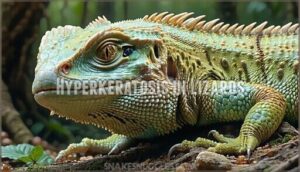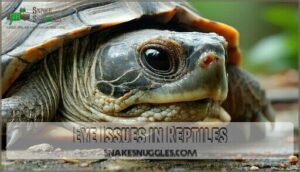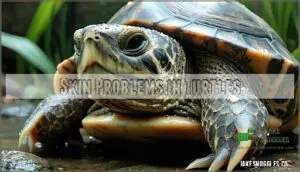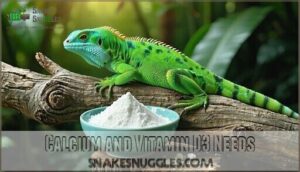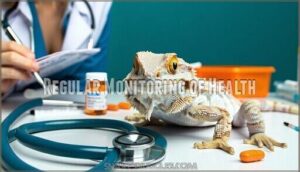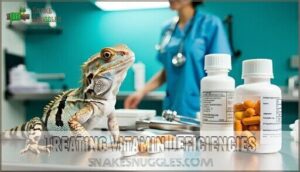This site is supported by our readers. We may earn a commission, at no cost to you, if you purchase through links.
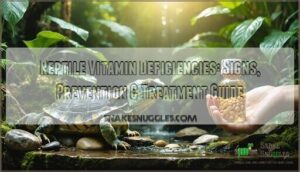
You’ll spot vitamin A deficiency through swollen, weepy eyes and difficulty shedding—like your reptile’s wearing foggy goggles it can’t remove.
Calcium shortages lead to metabolic bone disease, causing soft shells in turtles and rubbery bones in lizards.
B vitamin deficiencies trigger neurological issues and poor appetite.
These problems often stem from monotonous diets or inadequate UVB lighting.
The good news? Most reptile vitamin deficiencies are preventable with proper nutrition and environmental setup.
Understanding the warning signs means you can catch problems early, before they become serious health crises that require expensive veterinary intervention.
Table Of Contents
- Key Takeaways
- Reptile Vitamin Deficiencies
- Vitamin a Deficiency Symptoms
- Calcium and Vitamin D3 Needs
- Preventing Vitamin Deficiencies
- Treating Vitamin Deficiencies
- Frequently Asked Questions (FAQs)
- What are the nutritional deficiencies of reptiles?
- What vitamin deficiency do bearded dragons have?
- How often should I give my reptile calcium with D3?
- What does vitamin A deficiency look like in leopard geckos?
- Can reptiles overdose on vitamin supplements?
- Which vegetables provide essential vitamins for herbivorous reptiles?
- How often should vitamin supplements be administered?
- Do different reptile species require different vitamins?
- Can vitamin deficiencies cause reproductive problems?
- Conclusion
Key Takeaways
- You’ll catch vitamin A deficiency early by watching for swollen eyes, difficulty shedding, and dull skin color in your reptile
- Maintain a 2:1 calcium to phosphorus ratio and provide proper UVB lighting to prevent metabolic bone disease that affects up to 80% of captive reptiles
- Feed your reptile a varied diet with gut-loaded insects and appropriate vegetables rather than relying on monotonous feeding schedules
- Monitor your pet’s health monthly and schedule annual vet checkups to catch deficiencies before they become expensive medical emergencies
Reptile Vitamin Deficiencies
Vitamin deficiencies can seriously harm your reptile’s health, causing everything from soft bones to eye problems.
Understanding these common nutritional issues helps you spot warning signs early and provide proper care before minor deficiencies become major health crises.
Metabolic Bone Disease
Metabolic bone disease strikes up to 80% of captive reptiles without proper UVB lighting.
Most reptile owners discover MBD symptoms only after irreversible bone damage occurs.
You’ll notice soft jaws, bone deformities, and spontaneous fractures when calcium deficiency symptoms develop.
This reptile vitamin deficiency results from poor calcium ratio to phosphorus levels and vitamin D3 deficiency.
Maintaining nutrient balance through reptile vitamin supplements prevents this devastating bone health condition.
Hypervitaminosis D
While calcium deficiency wreaks havoc on bones, too much vitamin D creates its own nightmare.
Hypervitaminosis D occurs when you feed your reptile high-vitamin D foods like dog or cat food, causing dangerous mineralization effects throughout their body.
This vitamin D toxicity triggers kidney damage as calcium deposits accumulate in tissues.
Your reptile’s kidneys can’t handle this dietary imbalance, leading to serious health complications requiring immediate veterinary intervention.
Hypovitaminosis A
Ignoring proper dietary needs creates a vitamin A deficit that wreaks havoc on your reptile’s skin and eye health.
This nutritional deficiency compromises their immune system, causing hyperkeratosis, difficulty shedding, and blindness in severe cases.
Leopard geckos, chameleons, and aquatic turtles frequently develop these reptile health issues without adequate supplementation and varied diets, leading to severe consequences if not addressed properly with a focus on reptile health.
B Vitamin Deficiencies
B vitamin deficiencies plague piscivorous reptiles fed unbalanced diets.
Thiamine deficit and B6 toxicity trigger neurological signs including ataxia symptoms, blindness, and seizures.
Fish-eating species like water snakes show these problems most often.
You’ll notice coordination issues first – your snake might wobble or struggle to strike prey accurately.
Reptile nutrition supplements containing B-complex vitamins prevent these serious complications in captive animals.
Recognizing vitamin deficiency symptoms is essential for maintaining the health of reptiles, especially those prone to nutritional deficiencies.
Vitamin a Deficiency Symptoms
You’ll notice vitamin A deficiency symptoms developing gradually as your reptile’s health declines.
The most common signs include dull skin color, difficulty shedding, eye problems like squinting or swelling, and decreased appetite that leaves many owners scratching their heads.
Hyperkeratosis in Lizards
When vitamin A deficiency strikes lizards, their skin tells a troubling story through hyperkeratosis.
You’ll notice their once-smooth scales becoming thick and rough as epidermal cells transform from their normal cuboidal shape into flat, scaly layers.
This reptile dermatology condition creates dull, lackluster lizard skin that struggles during shedding cycles, signaling underlying nutritional deficiencies through a process that affects their overall health and skin.
Eye Issues in Reptiles
Your pet’s eyes reveal vitamin A deficiency faster than any blood test.
Up to 40% of captive reptiles develop ocular diseases, with vitamin A deficiency causing 30-55% of turtle eye problems.
You’ll notice swollen eyelids, conjunctivitis, and corneal ulcers that can progress to blindness causes if untreated.
Vision loss accelerates when eye infections develop from weakened immune systems, making early detection essential for preventing permanent ocular diseases.
Skin Problems in Turtles
Your turtle’s skin tells a story when vitamin A runs low.
Aquatic turtles develop periocular edema around their eyes, while hyperkeratosis creates thickened, scaly patches across their shell and limbs.
These cutaneous infections and scute problems often mask underlying reptile nutritional deficiencies.
Shell lesions and skin ulcers follow, turning minor turtle dermatitis into serious reptile health problems requiring immediate attention.
Calcium and Vitamin D3 Needs
Your reptile’s calcium and phosphorus balance directly impacts bone health, with an ideal ratio of 2:1 calcium to phosphorus preventing metabolic bone disease.
Vitamin D3 works alongside UVB lighting to help your pet absorb calcium properly, making both supplementation and proper lighting essential for strong bones and overall health.
Proper Calcium to Phosphorus Ratio
Getting your Calcium Balance right is essential—aim for a 2:1 calcium to Phosphorus Levels ratio to prevent reptile metabolic bone disease.
Most feeder insects pack terrible Nutrient Ratios (often 1:19!), so you’ll need calcium supplements to fix Mineral Metabolism.
Poor ratios cause calcium deficiency symptoms and wreck Bone Health, making reptile nutritional deficiencies inevitable without proper reptile vitamin requirements.
Reptile owners can benefit from understanding calcium supplements to address these issues.
Vitamin D3 Supplementation
Most reptiles need D3 supplementation since they can’t produce enough naturally indoors.
You’ll want products containing 20,000-60,000 IU/kg for safety—higher doses risk toxicity.
Diurnal species need D3 supplements 3-4 times monthly, while nocturnal reptiles require more frequent dosing.
This supports calcium absorption and prevents metabolic bone disease that weakens bones.
Reptile owners should understand UVB radiation effects to provide proper care, and recognize the importance of D3 supplementation.
UVB Lighting for Reptiles
Proper reptile illumination requires full-spectrum UVB lighting to synthesize vitamin D3 naturally.
You’ll need fluorescent tubes, compact lamps, or mercury vapor bulbs positioned correctly for maximum UVB benefits.
Replace bulbs annually since output degrades over time, even when they still produce visible light.
Control photoperiod cycles to match your species’ natural habitat requirements for ideal reptile health supplements absorption.
Understanding the role of UVB lighting needs is essential for preventing metabolic bone disease in reptiles, and ensuring reptile health.
Preventing Vitamin Deficiencies
You can prevent vitamin deficiencies in your reptile by providing a varied diet that meets their species-specific nutritional needs.
Regular health monitoring and proper gut-loading of feeder insects will help catch deficiencies early and guarantee your pet gets essential vitamins.
Varied Diets for Reptiles
Diversity champions your reptile’s health through dietary rotation and food variety.
Mix crickets, dubia roaches, and waxworms as feeder insects, while gut loading them with high-quality nutrients 24-48 hours before feeding.
This nutrient cycling approach prevents reptile vitamin deficiencies by mimicking wild diets.
Include leafy greens, squash, and whole prey items to address reptile dietary needs thoroughly for ideal reptile care nutrition.
A balanced reptile food mix is vital for maintaining proper nutrient levels in your pet reptiles.
Regular Monitoring of Health
Three key practices keep your scaly companion thriving and help catch problems before they become serious health crises.
- Monthly Health Checks – Examine your reptile’s eyes, skin, and behavior patterns for early warning signs of reptile vitamin deficiencies
- Annual Veterinary Care – Schedule professional reptile exams with an exotic vet experienced in reptile health and nutrition planning
- Weekly Disease Prevention monitoring – Track appetite, weight, and shedding cycles to maintain ideal reptile care nutrition
Regular monitoring also involves understanding the importance of calcium supplements to prevent deficiencies and related health issues.
Gut-Loading of Feeder Insects
You can’t just toss any cricket into your reptile’s enclosure and call it nutrition.
Gut loading transforms ordinary feeder insects into vitamin-packed powerhouses by feeding them nutritious foods 24-48 hours before offering them to your pet.
This process boosts insect nutrition and feeder quality dramatically, and helps prevent vitamin B12 deficiency and vitamin E deficiency in your reptiles by loading crickets, mealworms, and dubia roaches with leafy greens, commercial gut-loading diets, and vitamin-rich vegetables.
Treating Vitamin Deficiencies
When your reptile shows signs of vitamin deficiency, prompt treatment prevents permanent damage and restores health.
You’ll need to combine supportive care with targeted vitamin supplements while addressing any underlying issues that caused the deficiency.
Supportive Care for Reptiles
When your scaly friend battles vitamin deficiencies, supportive care becomes your lifeline.
Focus on Reptile Hydration through proper water sources and humidity levels, while Environmental Enrichment reduces stress that hampers recovery.
Gentle Reptile Handling prevents additional trauma, and maintaining proper Nutrient Cycling supports healing.
Always seek Veterinary Guidance for thorough reptile care advice personalized to your pet’s specific needs.
A well-planned reptile nutrition plan is essential for preventing vitamin deficiencies and promoting overall health.
Vitamin Supplements and Dosage
Your reptile’s supplement routine requires precision to avoid dangerous overdoses or persistent deficiencies. Choose multivitamin powders with guaranteed analysis, matching supplement types to your pet’s diet.
- Herbivores: Use ½ teaspoon vitamin powder per 5 oz body weight
- Insectivores: Dust 12 crickets weekly per 2.5 oz body weight
- Dosage timing: Supplement 2-3 times weekly, alternating with calcium-only days
- Supplement safety: Replace vitamin powders every 12 months for potency
Proper supplementation practices involve understanding reptile nutrition needs to prevent deficiencies.
Addressing Underlying Health Issues
Beyond managing symptoms, you’ll need to tackle the root causes that created vitamin deficiencies in the first place.
Thorough health checks help identify underlying issues affecting reptile nutrition and metabolism.
Veterinary care guarantees proper disease prevention through targeted dietary balance adjustments.
| Health Issue | Impact on Vitamins | Care Solution |
|---|---|---|
| Poor UVB lighting | Blocks D3 synthesis | Replace bulbs annually |
| Incorrect temperatures | Reduces metabolism | Monitor thermal gradients |
| Parasitic infections | Impairs nutrient absorption | Regular fecal exams |
Frequently Asked Questions (FAQs)
What are the nutritional deficiencies of reptiles?
Like a house of cards, your reptile’s health crumbles without proper nutrition.
You’ll encounter vitamin A deficiency causing eye problems, metabolic bone disease from calcium imbalances, and vitamin D3 deficiency disrupting growth in captive reptiles.
What vitamin deficiency do bearded dragons have?
Bearded dragons commonly develop vitamin A and vitamin D3 deficiencies. You’ll notice signs like eye problems, difficulty shedding, and metabolic bone disease if they’re not getting proper nutrition.
How often should I give my reptile calcium with D3?
While many think daily calcium’s necessary, you’ll actually want to dust feeder insects with calcium plus D3 just twice weekly.
This prevents overdose while ensuring proper bone development and preventing metabolic bone disease.
What does vitamin A deficiency look like in leopard geckos?
Your leopard gecko’s vitamin A deficiency will show up as dull, dry skin that won’t shed properly, squinting or swollen eyes, and decreased appetite.
You’ll notice the skin becomes thick and scaly-looking instead of smooth and vibrant, which is a clear indication of the deficiency, and this can be accompanied by swollen eyes.
Can reptiles overdose on vitamin supplements?
Yes, reptiles can definitely overdose on vitamin supplements, especially vitamin A and D You’ll see symptoms like skin sloughing, loss of appetite, and organ damage if you give too much.
Which vegetables provide essential vitamins for herbivorous reptiles?
Dark leafy greens like collard greens, dandelion greens, and mustard greens provide vitamin A for herbivorous reptiles.
Squash and sweet potatoes offer beta-carotene.
You’ll want calcium-rich options like kale and turnip greens too.
How often should vitamin supplements be administered?
You’ll need to tailor supplement frequency to your reptile’s species and diet.
Most herbivorous reptiles benefit from calcium dusting 2-3 times weekly, while vitamin supplements work best once weekly to prevent deficiencies.
Do different reptile species require different vitamins?
Different reptile species absolutely need customized vitamin approaches.
Herbivorous iguanas require vitamin A-rich leafy greens, while insectivorous geckos need gut-loaded prey plus supplements.
Aquatic turtles face higher vitamin A deficiency risks than terrestrial species.
Can vitamin deficiencies cause reproductive problems?
Vitamin deficiencies absolutely wreak havoc on your reptile’s reproductive system.
You’ll see egg-binding, infertile eggs, and poor breeding success when essential nutrients like vitamin A and calcium aren’t available for proper hormone production and egg development.
Conclusion
Maintaining your reptile’s health isn’t rocket science—it’s simply about understanding their unique nutritional blueprint.
By recognizing early warning signs of reptile vitamin deficiencies, providing species-appropriate diets, and ensuring proper UVB lighting, you’ll keep your scaly companion thriving for years.
Remember, prevention costs pennies compared to veterinary bills, so invest in quality supplements and varied nutrition now, which will contribute to your reptile’s vibrant colors and active behavior, and they will thank you.
- https://www.vetlexicon.com/exotis/reptiles/nutrition/articles/hypovitaminosis-a/
- https://veterinaryvisioncenter.com/vitamin-a-deficiency-in-pet-reptiles/
- https://pmc.ncbi.nlm.nih.gov/articles/PMC11939201/
- https://www.sciencedirect.com/science/article/abs/pii/S1096495910000540
- https://www.dvm360.com/view/insectivorous-reptile-nutrition-and-disease-proceedings

